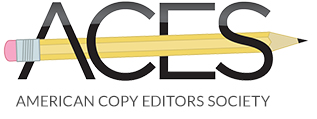I made this edit one night last week:
The company adopted new accounting standards after the acquisition that significantly impacted affected its results, so comparisons with year-ago results are skewed.
I admit that it was an almost automatic action on my part. I had about 18-20 pieces of copy to edit that night, and we copy editors have had it drilled into our heads that the verb impact should be used sparingly, if ever. Most of the time, we've been told, it can be changed to affect or influence. Impact, some editors say, is an example of a noun turned into a verb, and they hate it. I think I made the right edit in the sentence, but I decided to examine my teaching on this — because the more I read and learn about usage, the more I realize that nothing is as black-and-white as most copy editors see it.
The first authority I cite on this is the widely influential and revered "The Careful Writer" by Theodore M. Bernstein, published in 1965. Bernstein writes, "A strong word, impact is in danger of losing some of its power at the hands of the kind of faddists who are always reaching for the flame thrower to light a cigarette." He says the word should imply a forceful collision. The use he cites is of the noun. He doesn't even seem to recognize it as a verb.
"The New York Times Manual of Style and Usage" says that the verb impact means "strike with force." Imagine the collision of two heavenly bodies. The Times stylebook says, "Do not use it to mean affect or have an effect; in that sense, it is technical jargon." I am certain that the Times' thinking on this word is the most direct influence on the strictures placed on impact as a verb in the olden days (the last quarter of the 20th century anyway) at The N&O. (By the way, that other big influence, "The Associated Press Stylebook," doesn't mention impact.)
R.W. Burchfield's 1996 edition of "Fowler's Modern English Usage" notes that impact as a verb meaning "to press closely into or in something" is actually an older usage than the noun. But he says that the widespread figurative use in the 1960s drew criticism as jargon and barbarism. He counsels writers to avoid that use. "It is very likely that it will pass into uncontested standard use as time goes on. At present it has something of the air of a guest who has turned up at a party uninvited." If I could, I would tell Mr. Burchfield that the word still is not an accepted member of word society in some journalistic circles.
Bryan A. Garner in "Garner's Modern American Usage" (Third edition, 2009) doesn't toss out the verb impact altogether, but he says that if affect will do the job, use it. He also suggests "have an impact on" as an alternative, but, among my colleagues, that would be considered wordiness.
But now I turn to the usage authority that many of my colleagues would consider too lax — "Merriam-Webster's English Usage Dictionary" (copyright 2002, 2010). I downloaded this book to my Kindle last week, so now I can carry it around with me wherever I go. This is language geek cool!
M-W says the figurative use of the verb impact became widespread about 1980 and that is when the criticism started in earnest. The M-W editors say that the references since 1980 come less from literary sources and more from politicians, business writing and reportage. I can see how a word used by politicians and business people might carry a whiff of jargon, and if there is one thing that has been pounded into our heads, it is that jargon turns off readers — even the readers who use jargon.
The M-W editors make a good point about substituting affect for impact: spelling. People don't always spell affect correctly, and computer spellcheckers will not catch effect for affect.
So where did this source checking leave me? I will continue to look at impact with suspicion, but not disdain. Unless a writer is reporting on a high-speed wreck, I expect to change the word.
For more on impact, here is a link to an entry at Everything You Know About English Is Wrong.
This article was originally posted by the Raleigh News & Observer, a subsidiary of The McClatchy Co.; is posted here to provide continuity; and is copyright © 2011 The News & Observer Publishing Company, which reserves the right to remove this post.
